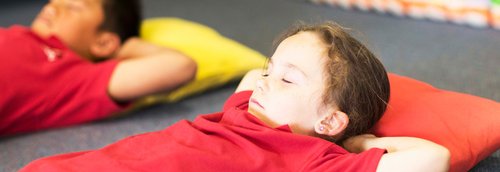Fiona Humphries, a researcher and kaiako, has gone out to find why it's important to take care of yourself.
Familiar with hearing those same staffroom narratives of stress, burnout and struggle, Fiona set out to find out if the stories were actually true.
“What I found was that, yes, we’re struggling. Teacher wellbeing is lower than the general population.”
Not satisfied to just let that lie, Fiona is still studying while working full time, and her research has shed light on what impacts teacher wellbeing.
“Workload is a huge issue for teachers,” Fiona says. “Teachers need strategies to learn to stop working all the time.
“Work is like a beast – if you feed it, it will keep growing.”
Fiona says teachers need to set boundaries, particularly around email.
“Don’t mix personal and work emails. Pick times that suit you to focus on emails and leave them alone at other times.”
This can be particularly hard at weekends, and Fiona’s research showed that a lot of teachers feel they need to work on the weekend.
“In fact,” she says, “some people like to work weekends. It helps them feel more prepared for the week ahead. For folks pursuing this route, remember to focus on what needs to be done – don’t fall into the trap of busy work.
“We are professionals. We don’t have to be available until 10pm seven days a week. Our accountants and lawyers don’t work those hours!”
Fiona’s heard the ‘work smarter, not harder’ advice time and again during her research, and she is keen for others to benefit from some of the great advice that was given to her during her studies.
“Things like learning what wellbeing looks like on a personal level,” she says. “What tells you you’re not well and need some extra attention? It could be feeling anxious or having a sore tummy… feeling wound up. Pay attention to these physical signs – know what your normal is and when you’re feeling off.
“Self-knowledge is your best wellbeing tool.
Fiona knows teachers are constantly generating great ideas. She suggests a ‘cool ideas’ list or even a journal on some neat stationery.
“These are thoughts that teachers can look to when they’ve got time – but if they don’t get to them, that’s okay too.
“We can also find ‘cheats’ to minimise work where we can. Not everything has to be laminated. Classroom décor should be student-led, so take the opportunity to showcase their work.”

Fiona is a fan of the Mental Health Foundation’s Five Ways, but she encourages teachers to use them as actions, not just a framework.
“Connection is so important. Get to know your colleagues!
“Validation is super important to teacher wellbeing, it has a massive positive impact. And when validation is missing, that isn’t neutral, it negatively impacts teacher wellbeing.
“The cool news every member of staff can play a part with this. By noticing and validating teachers, it can actually be the start of grassroots change at a school.”
The research, Fiona says, showed a few differences between primary and secondary schools, with the main difference being that of concern for colleagues.
“Secondary school teachers really worry about the work loads of teachers in other subjects. Teachers really care about their colleagues!”

Fiona says taking notice, giving of your time, and being active are also essential.
“So is sleep! This is one of those things that teachers can have real control over, which can reduce that feeling of powerlessness that can come with burnout and stress.
“You can make a time to go to bed and have a night time routine. And aim to get quality sleep – if you’re not getting good sleep, get some support and make this a priority.”
The opportunity to keep learning is also essential to wellbeing, but that doesn’t have to be formal training, says Fiona.
“I also noticed that a lot of wellbeing initiatives in school are well-meaning but some activities remove the teacher element of choice. Not everyone wants to yoga, for example.
“Wellbeing isn’t something we have to go and do. It’s about nourishing what is already in our lives. From the meals we eat, the books we read – even choosing to read at all – or seeing a movie with a friend, it can all make a huge difference to our wellbeing.”
Something small you can do is a daily dose of mindfulness, try it with your colleagues before a hui.
